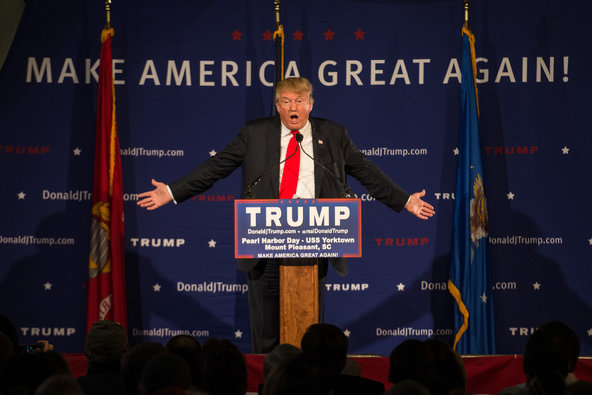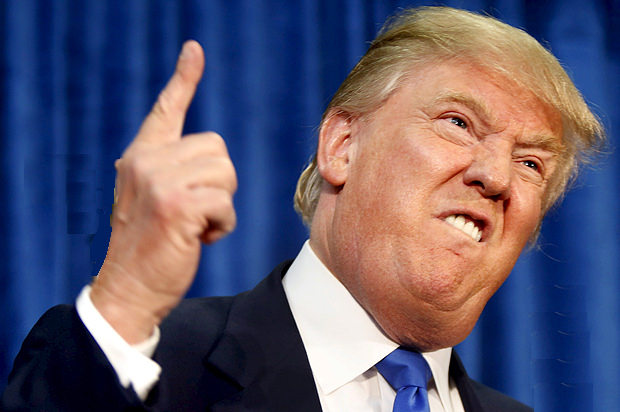The Problem With Trump's Call To Ban Muslim Immigrants And Why It Shouldn't Be A Surprise
Trump called for a ban on "Muslims entering the United States until our country's representatives can figure out what is going on," according to a statement released by his campaign on Monday, 7 December 2015.
On 7 December 2015, at 4:16pm US time, Donald Trump, the Republican Presidential front-runner who in September declared "I love the Muslims," reached an inevitable new low in his campaign's fixation on the Islamic State and Muslim immigrants.
In a statement released to the press, Trump demanded "a total and complete shutdown of Muslims entering the United States", meaning refugees, visitors, or anyone who happens to be a Muslim.
Donald Trump speaking at the U.S.S. Yorktown in South Carolina on Monday night. “We have no choice,” he said of his proposal.
Image via Sean Rayford/Getty ImagesSaying that “hatred” among many Muslims for Americans is “beyond comprehension,” Mr. Trump said in a statement that the United States needed to confront “where this hatred comes from and why.”
“Until we are able to determine and understand this problem and the dangerous threat it poses, our country cannot be the victims of horrendous attacks by people that believe only in jihad, and have no sense of reason or respect for human life,” Mr. Trump said.
A ban on Muslims – an unprecedented proposal by a leading American Presidential candidate and an idea more typically associated with hate groups, Donald Trump's remarks followed last week's shooting in San Bernardino, California, by a Muslim couple
The husband, Syed Rizwan Farook, was US-born. The wife, Tashfeen Malik, was born in Pakistan and came to the United States from Saudi Arabia, reported Reuters.
The Federal Bureau of Investigation said on Monday the couple had been radicalised.
The "justification" that Trump uses to support his idea comes from two places, namely Pew Research and Center for Security Policy.
As Philip Bump of The Washington Post explains, the problem with the Republican Presidential front-runner's prohibition of Muslims is that it relies on bad poll data from an extremely biased source.
We'll start with the Pew data. Trump doesn't link to it, so it's not clear what exactly he's looking at. Since Trump simply said that "large segments" of the "Muslim population" hate the United States, it's hard to tie that to a number. But that second set of data, from the "Center for Security Policy," is more important — and it's possible that Trump simply overlaid those findings onto Pew's estimates of the number of Muslims in the United States.
The Center for Security Policy is an organization run by Frank Gaffney, who is identified as an anti-Muslim extremist by the Southern Poverty Law Center. The survey Trump cites was conducted earlier this year on behalf of the organization.
Furthermore, Philip also lists a few caveats:
⇒ The survey conducted by the Center for Security Policy was an online survey of 600 people.
⇒ The questions asked were agree/disagree, which can favour an "agree" response.
⇒ The organisation conducting the survey matters because the Center for Security Policy likely sought poll numbers showing that a significant number of Muslims were supportive of violence against the United States, and the center got what it paid for.
Now on to the part about why his statement advocating a religious prohibition of Islam, the third largest faith in the US, shouldn't come as a surprise even though it is unlike anything in American history
Why?
Well, as Evan Osnos, who covers politics and foreign affairs for The New Yorker, points out, Donald Trump, during the past six months, has ushered the spirit of bigotry onto the main stage of American politics more overtly than any figure in decades.
Adding further, Osnos argues that while some may dismiss Trump as more of an opportunist than a considered racist (which he is, given the number of racial statements he has made so far including his attack on Mexicans calling them "rapists"), the harder question, Osnos writes, is more awkward to ask:
What does it say about all of us, as Americans, that he has made it so far?
"Trump is adept at dividing the world into "us" and "them," because he knows that audiences find it comforting," argues Osnos, remarking, "but to pretend that we've not allowed his spirit to fester is to grant ourselves a measure of relief that we do not deserve"

